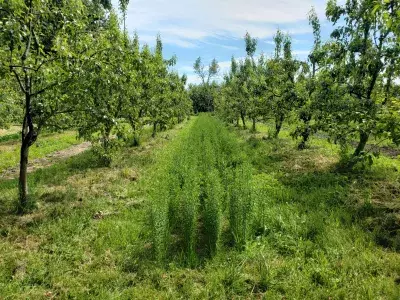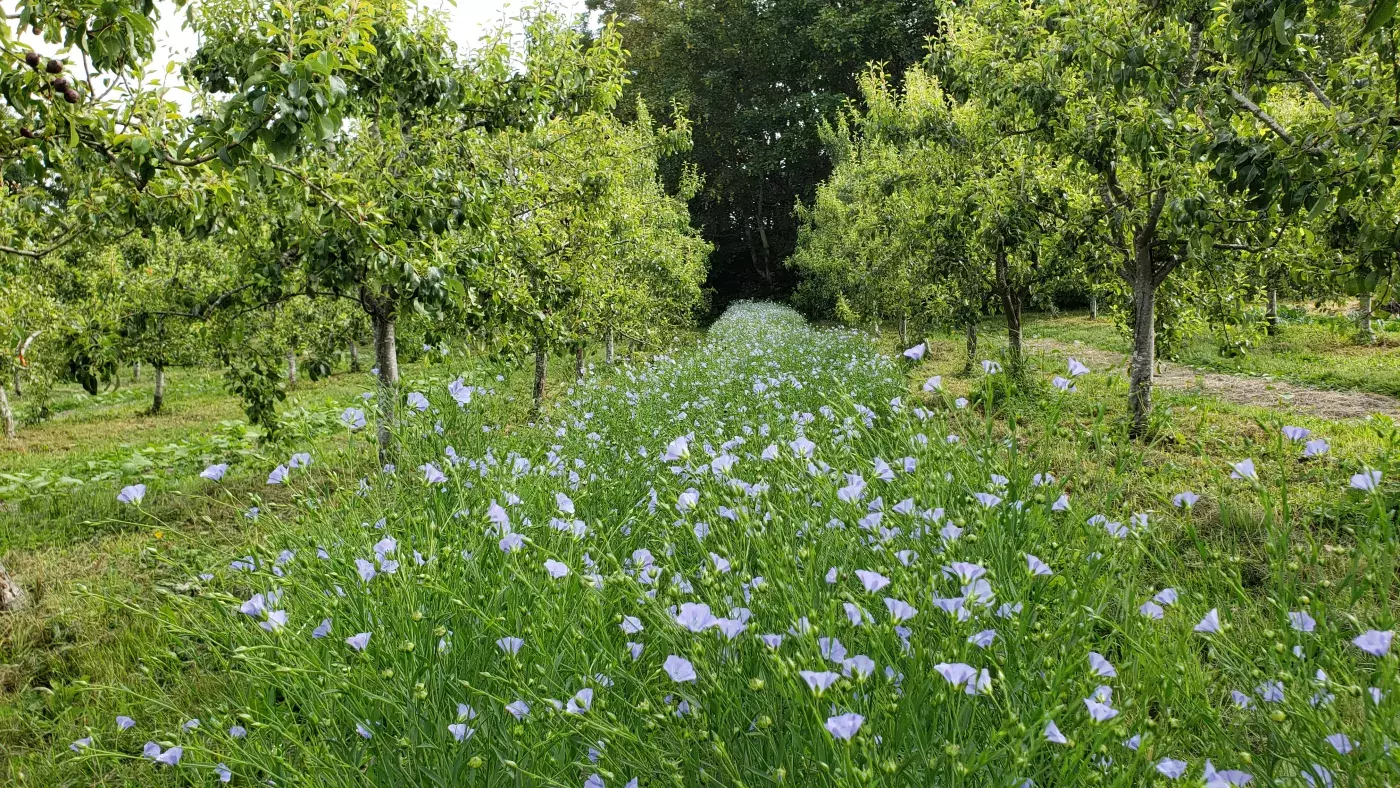

Orchard Alley Cropping Research and Demonstration
Background
Productive agroforestry is a set of agricultural technologies and practices that integrate trees and other forms of agricultural production in the same space, resulting in multifunctional agroecosystems that can produce nutritionally diverse foods and support a greater degree of biodiversity and ecosystem services than annual or perennial monocultures. Productive agroforestry involves the integration of fruit and nut production with complimentary uses of the understory and alleys for hay, annual crops, herbaceious perennials, shrubs, and/or animal grazing. Generally, the complexity of management increases with the number of intercropped species and vegetation layers, representing tradeoffs in efficiency, nutritional diversity, and total food production in the system. Best management practices for satisfying different goals (such as carbon storage, protein production, total food production, biodiversity, early cashflow, nutritional diversity) while maintaining easily manageable and harvestable orchards have yet to be established for the Pacific Northwest.
One of ISFS’s strategic priorities is to establish production research and demonstration plots supporting the organic/regenerative sector on the farm sites we operate. The orchard at the Gilbert Road farm in Richmond presents a unique opportunity to establish a productive agroforestry demonstration site that is responsive to the City of Richmond’s strategic priorities for farming, and provides education and extension opportunities for farmers and landowners who are interested in integrated perennial production.
Project description
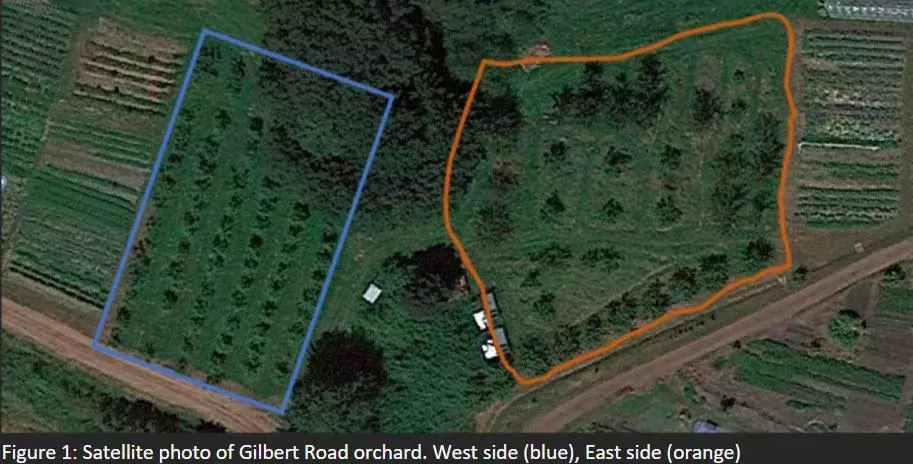
This project aims to establish a productive agroforestry demonstration site by adding alley crops, infill trees, and intermediate layers of vegetation at the existing orchard site of the Gilbert Road farm. The system will demonstrate agroforestry management on a spectrum of intensities, designed to satisfy several system goals. Specifically, we propose to
- bring the management of the orchard at Gilbert Road farm up to normal organic production standard
- establish a pulse/small grain/vegetable alley cropping demonstration (West side) and diversified woody perennial polyculture demonstration (East side)
- establish an ongoing data collection protocol for management practices, inputs, and yields that can be sustained over the long term
involve stakeholders including students, incubators, researchers, and farmers (fruit & nut, vegetable, and small-grain producers) in a highly integrated production system they may not be familiar with through field days and appropriate publications
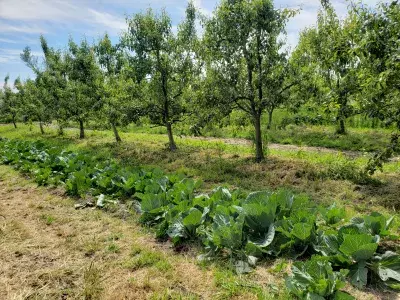
Year 1 Demonstration in 2024
This project aims to establish a productive agroforestry demonstration site by adding alley crops to the existing orchard site of the Gilbert Road farm. This alley crop is designed to satisfy several system goals:
- Nutritional diversity – supplementing the micronutrient and sugar content of fruit production with micronutrient content from storage vegetables (cabbage, winter squash) and protein, starch, and fat from pulse and small grain staple crops. The alley crop has been planned for a three year crop rotation.
- Demonstrating transition from orchard floor to alley crop production using no or low-till methods.
- Demonstrating alley crop production using a range of management intensities.
| Alley 1 (Veg 1) | Alley 2 (Veg 2) | Alley 3 (Pulse/grain 1) | Alley 4 (Pulse/grain 2) | Alley 5 (Pulse/grain 3) | Alley 6 (Pulse/grain 4) |
system goal | Micro-nutrient diversity, early cashflow | Micro-nutrient diversity, early cashflow | Staple food production, early cashflow | Staple food production, early cashflow | Staple food production, early cashflow | Staple food production, early cashflow |
Prep | Black plastic (fall, winter | Black plastic (fall, winter | Black plastic (fall, winter)
| Black plastic (fall, winter)
| Black plastic (fall, winter)
| Black plastic (fall, winter)
|
Year 1 crops | cabbage | squash | flax
| Dry beans | Dry beans | Dry beans |
In Year 1 of the demonstration, the intercropping of 6 pear rows with storage crops (e.g., dry beans, cabbage, flax, and winter squash) was completed. Cabbages were transplanted and squashes were transplanted and seeded directly. Flax was sowed using the Jang seeder without tilling, but after raking of residue. Beans were sowed using the Earthway seeder after shallow tilling.
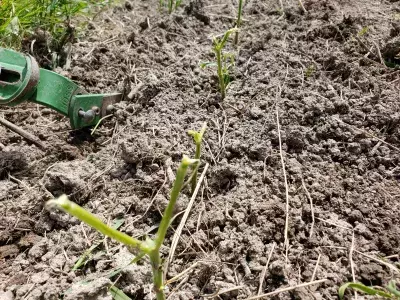
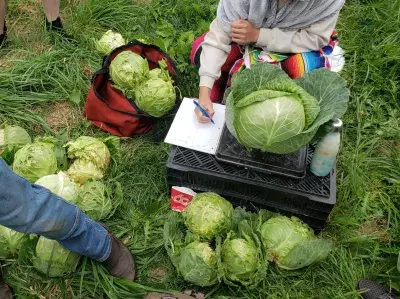
On August 24, 2024, we organized a demonstration field day on the Gilbert Road farm. This event showcases how alley cropping works with growing fruit trees and annual storage crops, and demonstrates a range of alley-cropping options from high to (relatively) low management intensity.
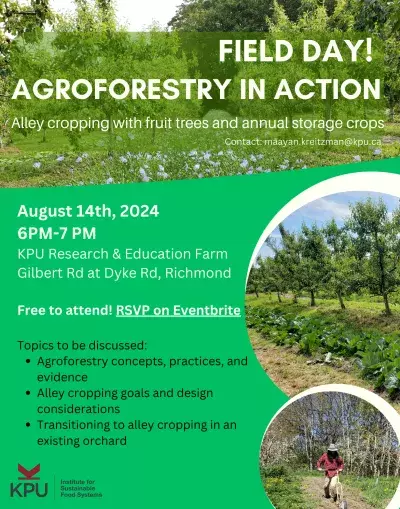
Year 2 Demonstration in 2025
Year 2 demonstration work is in the planning stage. There will be another round of site preparation work, pruning, understory plant propagation and planting, and alley crop planting with crop rotations.
